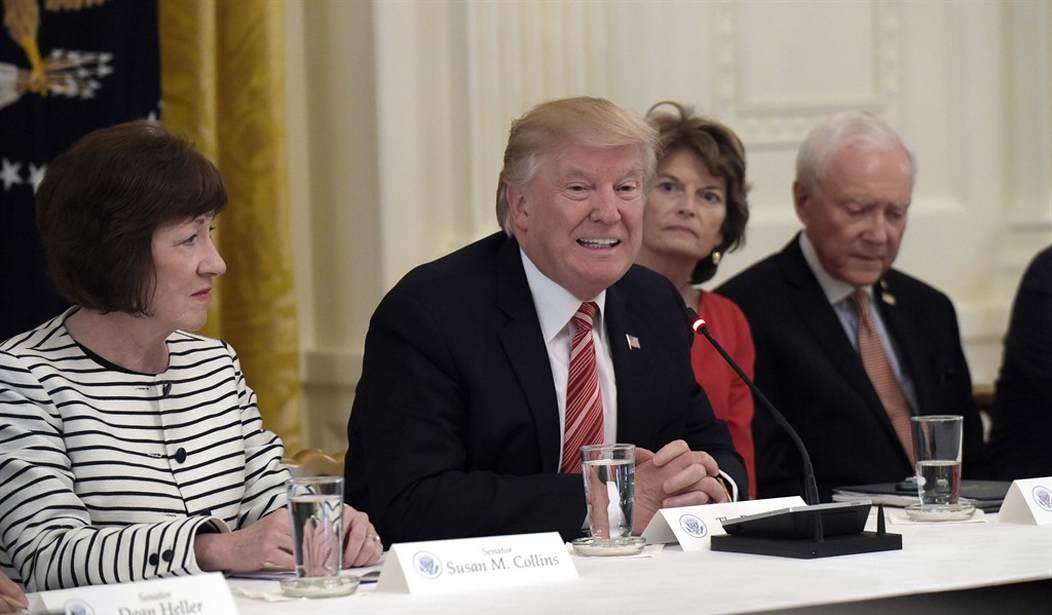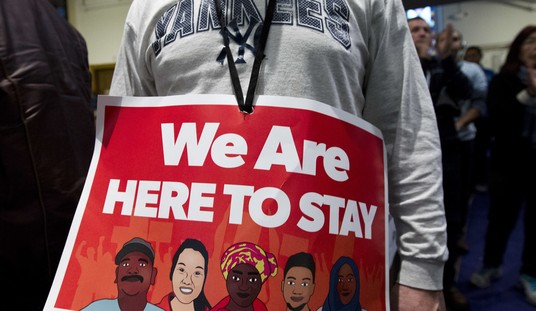The merry little media war between Donald Trump and national outlets did not find itself limited to the “Amazon Washington Post,” which Allahpundit covered earlier. Before taking on the Bezos empire, Trump went on the attack against the New York Times, not exactly a new target for Trump’s ire. The specific catalyst in this case was their coverage of his meeting with Senate Republicans, and the description of Trump’s engagement as lacking in basic knowledge of the Senate bill — and the issue in general:
Until Tuesday’s meeting at the White House, Mr. Trump had spoken with only a few members of the Senate, according to an administration official. The pace was nothing like the dozens of calls he made to help pass the House’s health bill, aides said.
A senator who supports the bill left the meeting at the White House with a sense that the president did not have a grasp of some basic elements of the Senate plan — and seemed especially confused when a moderate Republican complained that opponents of the bill would cast it as a massive tax break for the wealthy, according to an aide who received a detailed readout of the exchange.
Mr. Trump said he planned to tackle tax reform later, ignoring the repeal’s tax implications, the staff member added.
It didn’t take long for Trump to respond this morning on his favorite platform:
https://twitter.com/realDonaldTrump/status/880015261004435456
https://twitter.com/realDonaldTrump/status/880017678978736129
To some extent, the description in the NYT seems unnecessary. Does anyone really expect Trump to be a policy wonk, especially on a bill whose details seem to be murky even for members of the Senate? If Trump largely outsourced the details to Mitch McConnell before yesterday, the choice makes a lot of sense. McConnell is the master strategist and is closer by far to the key players. Trump, to put it gently, is not a details man — he’s an ideas and message man. No one would have expected Trump to delve into the details, a task which would normally have been delegated on the White House side to either OMB chief Mick Mulvaney or HHS Secretary Tom Price, both of whom have a great deal of experience on the issue.
The purpose of yesterday’s meeting was clearly political and not directly policy oriented anyway. Trump wanted to get all the Senate Republicans in one room to remind them of the consequences of failure and to work together on a solution. The GOP cannot afford to fail on repealing ObamaCare after seven years of promises, and it doesn’t take a keen grasp of detail to understand that much. They have to pass something that works, obviously, and something that can pass through reconciliation, as Democrats will not cooperate on an ObamaCare repeal under any circumstances, but they’d better get to a majority soon, or it will endanger Trump’s planned tax reforms under reconciliation. Trump clearly understands enough to know that, too. The NYT aside near the end of their article is not really “fake news,” but it’s not really news either.
Trump can’t be all that unhappy with the NYT story, though, as it allows him to continue his attacks on the media — and the media to continue its attacks on Trump. It’s a media war benefiting both sides, as I write in my column today at The Week, at least in the short run:
President Trump’s contempt for the media is hardly a shock. He campaigned in part by attacking the national news media as hopelessly biased, both against him and the voters who see mainstream media coverage as demeaning or dismissive. Even if going to war with the media creates collateral damage to the administration along the way, the ongoing fight will play very well with Trump supporters, and more broadly with Republicans who have long-standing gripes with media bias. Having Acosta and other reporters continually attack Trump plays into the White House’s hands as an affirmation of bias, no matter how justified the criticism might be.
Recent cases of media failures don’t hurt the White House position, either. CNN had to retract a story on the Russian-collusion investigation after getting hung out to dry using a single anonymous source, and the reporter and two editors involved resigned. CNN had to put significant restrictions on future reporting on the topic, and other media outlets may need to take a closer look at their own performance on a speculative story that has yet to deliver after several months.
For the media, though, this war with the White House serves a purpose, too. First, the loss of the televised briefings does affect their ability not just to deliver transparency to viewers, but also to promote their personnel in the press corps. They have a significant stake in getting the briefings back on TV. The fight also allows reporters to argue even further that the media should take an adversarial role with politicians to hold them accountable, and that anything less than full transparency is a danger to an informed public. It gives them an opportunity to paint themselves as the front line in the fight for democracy.
With these incentives in place, don’t expect the media war to abate soon.








Join the conversation as a VIP Member